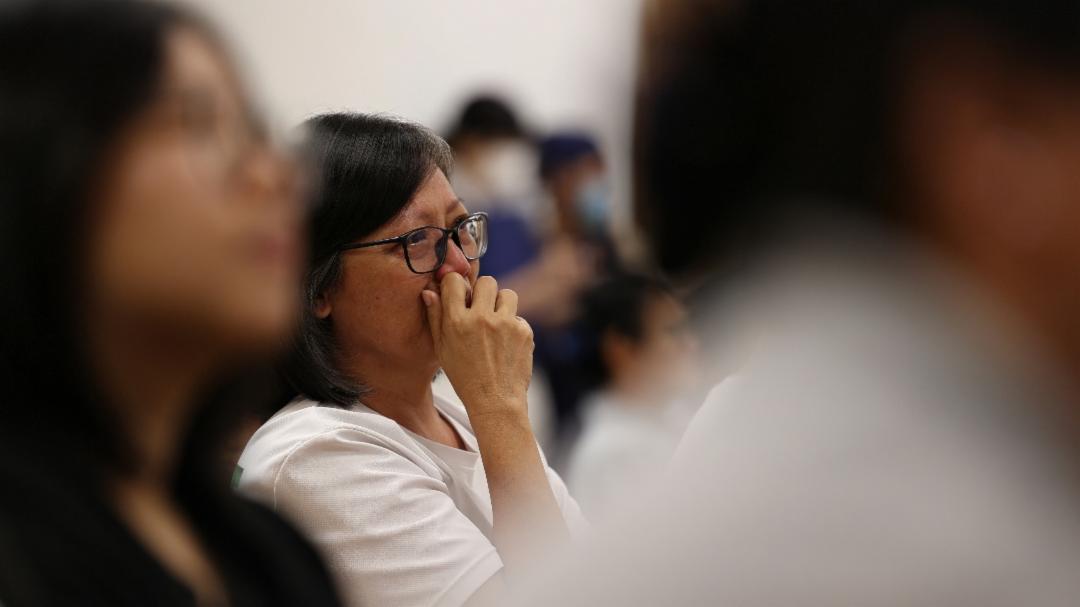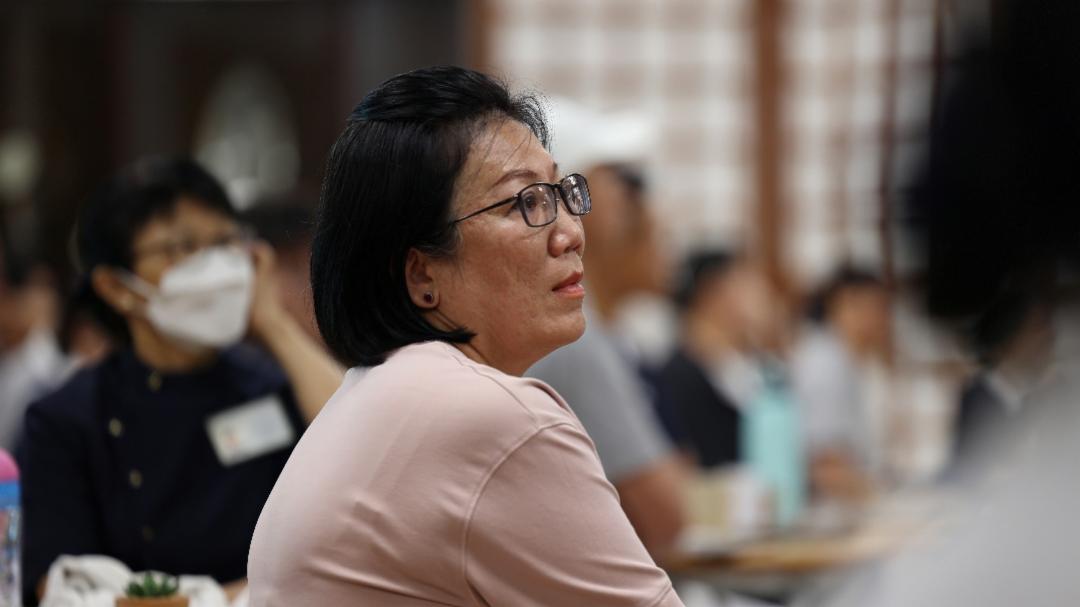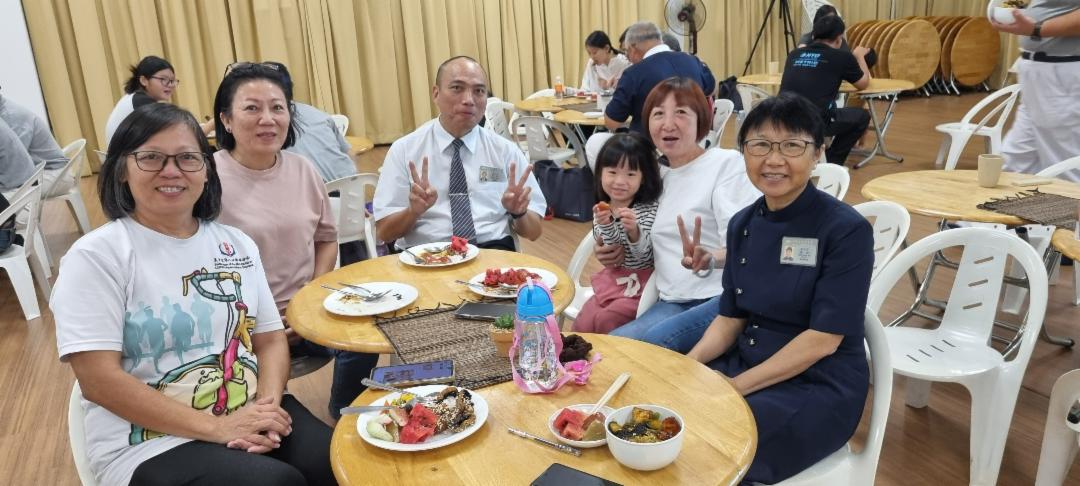“My EQ was low. I lost my temper easily,” he began, half-jokingly. The audience chuckled at his humour, but behind the laughter, many eyes brimmed with tears. This was no light-hearted tale, but the raw, real-life story of a boy raised amidst violence and chaos; a boy who once believed he might never return home alive.
Volunteer Loi Shiao Kiang came from Miri, Sarawak. Home, for him, was not a haven, but a place filled with alcohol, fists, and endless quarrels.
He could not recall a single day when his father drank plain water – mornings began with Cap Apek liquor, evenings ended with beer. His father did not work or connect with his family, only drank and picked fights. His mother laboured long hours selling fish at the market, yet peace never visited their home.
When his father was drunk, his mother bore the brunt of his rage. If Shiao Kiang failed to bring back the alcohol his father demanded, he was beaten. His relationship with his elder brother was equally strained. Once, the two of them confronted each other on the street with machetes, ignoring their mother’s tearful pleas.
Growing up in such a violent and oppressive environment, he began lashing out at school – beating up schoolmates, even seniors. He recalled with a wry smile, “I would walk into the grocery store in dirty clothes, and somehow, things on the shelves would ‘mysteriously’ go missing.”
He also frequented cockfights, where he watched adults gamble and fight over losses. Bloodshed became normal. “At cockfights, blood meant nothing,” he said. “When you punch someone, you have to hit hard enough to make their nose bleed; that’s when it feels satisfying.”
Once, after his friends slammed a schoolmate against a wall, leaving his face covered in blood, the schoolmate’s gang roamed the streets near his house on motorbikes, attacking random people. “That time, I was so terrified my legs went weak,” he recalled.
When the incident reached the police and his father was summoned to school, he did not reprimand his son. Instead, he told the teacher, “If my boy gets beaten and doesn’t fight back, then he is useless!” That moment sealed Shiao Kiang’s belief that “violence is strength; fists are the answer”.
◎ A turning point called love
No one expected Shiao Kiang to change, until he had a crush on a girl from the top A class. Originally in the bottom F class, he worked his way up through sheer determination, just to win her admiration. “And I ‘accidentally’ ended up in university,” he joked.
In 2001, he arrived at Universiti Putra Malaysia (UPM) in West Malaysia, with only a few hundred Ringgits from his sister. Alone in an unfamiliar city, facing cold realities and indifference, he contemplated ending his life at one point – not out of fear for the future, but because he did not know why he was living.
Filled with resentment, he sought out others who shared similar misfortunes. Together, they provoked drivers, picked fights, and even threatened policemen and judges. His anger became his armour, yet inside, he was empty.
As Shiao Kiang shared his life story during Tzu Chi Miri’s new volunteer training session on May 25, 2025, many in the audience were deeply moved. His sisters, especially, could not hold back their tears. For the first time, they understood the pain and hatred their little brother had carried for so long. That moment, compassion and empathy gently dissolved decades of unspoken family wounds.
◎ Words that sparked change
Shiao Kiang’s life took a new direction when he encountered Tzu Chi. Two Jing Si Aphorisms struck him deeply: “Be courageous when facing matters, not people” and “Learn to nod and bow, not to raise your fists”.
He thought, “Isn’t this talking about me?” Hence, he began to reflect on the deep hatred he held towards his father, a hatred nurtured by his mother’s constant reminders of her own pain and refusal to forgive. Back then, all he wanted was to grow up quickly and avenge her. After leaving home, he felt little attachment to the loveless household and never expected to return alive.
For years, he believed that only wealth and status could earn respect. Before encountering Tzu Chi, he worked in various industries, even as a private investigator, all in search of a way to change his fate.
Then one day, in a vegetarian restaurant, he came across a comic book titled “The Incredible Law of Karma”, which said that the only way to change one’s fate is through acts of kindness. This shook his beliefs. Later, reading “Liao-Fan’s Four Lessons”, he became convinced that fate could indeed be reshaped through virtue.
Someone once told him, “No matter how rich or capable you are, without Heaven’s blessing, nothing will work.” That was when he decided to give it a try and joined Tzu Chi.
At first, his motivation was self-serving, and Tzu Chi was simply a charity platform to earn blessings. He still took lottery bets and gambled in Genting Highlands. “Back then, I joined Tzu Chi because I wanted to get rich,” he confessed.
He recalled that what drew him in initially was the free lunch at the recycling centre. “You could even pack some home,” he said. Having once gone hungry in university, this was no small attraction.
Even after joining Tzu Chi and participating in charity home visits, he still lost his temper, fought and swore. “I just wanted to be a happy volunteer,” he shared. But when the recycling team leader he deeply respected passed away in his sleep, he was shocked. He decided to take over the responsibility and serve wholeheartedly.
◎ A heart healed through service
Once, Shiao Kiang accompanied a car accident survivor who had lost several family members in the crash, to go home. The sight of four or five coffins lined up side by side remains vivid in his memory. When everyone at the scene joined their palms to thank him, he realised, for the first time, how deeply society respects a truly dedicated volunteer.
From responding to disasters like the MH370 air tragedy, landslides, and international relief missions, he came to understand that “the world really needs living bodhisattvas.”
He shared, “I used to dream of wealth, luxury cars, and fine food. But before I could earn the blessings to enjoy such fortune, my fellow volunteers encouraged me to go vegetarian.” He resisted at first, but adopted the diet to qualify for volunteer certification. “Deep down, I wasn’t willing,” he admitted.
Then came two relief missions, to Sri Lanka and Cambodia, where he witnessed firsthand the sorrow and despair of disaster survivors. In Sri Lanka, floods and landslides had devastated communities, while at the same time, Cambodia was suffering from an intense drought—an unusual contrast that underscored the imbalance of nature. These extreme conditions were not just natural disasters, but signs of a world out of harmony.
On the flight home, he could not stop thinking about those survivors who had to stay behind and endure such suffering. That deep sense of helplessness made him reflect on what he could do to ease their pain.
He remembered Master Cheng Yen’s teaching that the only remedy for the world’s imbalance lies in vegetarianism. “If eating three vegetarian meals a day can help lessen disasters and reduce suffering, then what reason do I have to refuse?” From that moment on, he embraced vegetarianism wholeheartedly, not out of obligation, but from genuine conviction.
◎ A life not lived in vain
Over the past 18 years, Shiao Kiang has transformed from a “hopeless rascal” into a Tzu Chi volunteer devoted to serving others. Master Cheng Yen’s words that “Indulgence not only harms the Earth, but also depletes one’s blessings,” deeply resonated with him.
He also found truth in the reflections of many successful entrepreneurs: “If we were to remove the years we spent volunteering with Tzu Chi, our lives would be nothing but making money and indulging in pleasures.”
Two years ago, Shiao Kiang was hospitalised for two weeks with meningitis. “I told my wife that if I didn’t make it, I would just go first,” he shared. His heart was at peace; there was no fear.
“I started volunteering in my twenties,” he reflected. “This life hasn’t been lived in vain.” After recovery, he had only one thought, that is, to keep serving with Tzu Chi.
◎ A late but loving embrace
That day, his elder sisters sat in the audience, tears glistening in their eyes. His second sister, who is nine years older, had already entered the workforce when he was still in school. They hardly shared deep conversations.
“I’m ashamed,” she said softly. “There’s so much I never knew. I only learned today.” She remembered her little brother as mischievous, often punished, but never realised the violence he had endured.
“My brother’s temper, even the fact that he used to hit people – I never saw any of it. We keep in touch through social media, and he often shares about his Tzu Chi work in our group chats. But his past suffering, we never truly faced it.”
Her voice trembled with remorse and tenderness, “It’s our negligence… But thankfully, all that is behind us now. These past years, he has become mature, passionate, and deeply caring towards both family and others.”


Today, Shiao Kiang is the most dependable person in the family. “He takes care of everything at home, including finances. Though he is the youngest, he is the one who gives us the greatest sense of reassurance.”
She offered her brother a heartfelt message: “Persist in what you wish to do and what you’re meant to do. Follow in Master Cheng Yen’s footsteps, and keep walking the path, step by step. The one who will benefit the most will be you.”
Looking at her brother’s transformation, she spoke with gratitude, “Everything happens for a reason. Perhaps it was his pain that shaped the man he is today.”

●
Each act of compassion nourished Shiao Kiang’s once-parched heart like a gentle stream. He has learned not to raise his fists, but to listen. He said, “The old me believed only in violence. But now, I no longer chase after wealth. I treasure inner peace and wholeness.”
His transformation was made possible by the care and support of countless Tzu Chi volunteers, and by his own courage to release the past and embrace a new beginning.


![Loi Shiao Kiang shared his story with humour. It moved many to tears amidst the laughter. [Photo by Yong Joo Min] Loi Shiao Kiang shared his story with humour. It moved many to tears amidst the laughter. [Photo by Yong Joo Min]](/images/Articles/PPL/2025/MI20250525_yym03_001.jpg)
